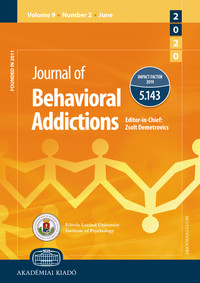COVID-19 pandemic lockdown and problematic eating behaviors in a student population
COVID-19 pandemic lockdown and problematic eating behaviors in a student population
Author(s): Valentin Flaudias, Sylvain Iceta, Oulmann Zerhouni, Rachel F. Rodgers, Joël Billieux, Pierre-Michel Llorca, Jordane Boudesseul, Lucia Romo, Pierre MaurageSubject(s): Behaviorism
Published by: Akadémiai Kiadó
Keywords: student; eating disorder; COVID-19 pandemic lockdown; problematic eating behaviors, binge eating
Summary/Abstract: Since mid-March 2020, over 3 billion people have been confined as a result of the COVID-19 pandemic. Problematic eating behaviors are likely to be impacted by the pandemic through multiple pathways. This study examined the relationships between stress related to lockdown measures and binge eating and dietary restriction in a population of French students during the first week of confinement. Methods. A sample of undergraduate students (N = 5,738) completed an online questionnaire 7 days after lockdown measures were introduced. The survey comprised variables related to lockdown measures and the COVID-19-pandemic, mood, stress, body image, binge eating and dietary restriction during the past 7 days, as well as intent to binge eat and restrict in the following 15 days. Results. Stress related to the lockdown was associated with greater likelihood of binge eating and dietary restriction over the past week and intentions to binge eat and restrict over the next 15 days. Greater exposure to COVID-19-related media was associated with increased eating restriction over the past week. Binge eating and restriction (past and intentions) were associated with established risk factors, including female gender, low impulse regulation, high body dissatisfaction, and having a concurrent probable eating disorder. Discussion and conclusion. The higher the stress related to the first week of confinement, the higher the risk of problematic eating behaviors among students, particularly those characterized by eating-related concerns. Screening for risk factors and providing targeted interventions might help decrease problematic eating behaviors among those who are most vulnerable.
Journal: Journal of Behavioral Addictions
- Issue Year: 9/2020
- Issue No: 3
- Page Range: 826-835
- Page Count: 10
- Language: English

